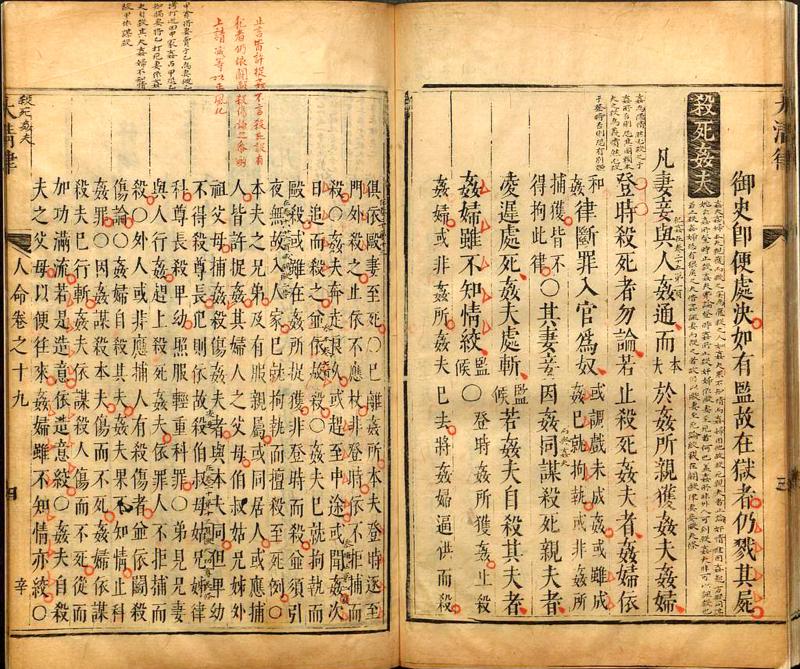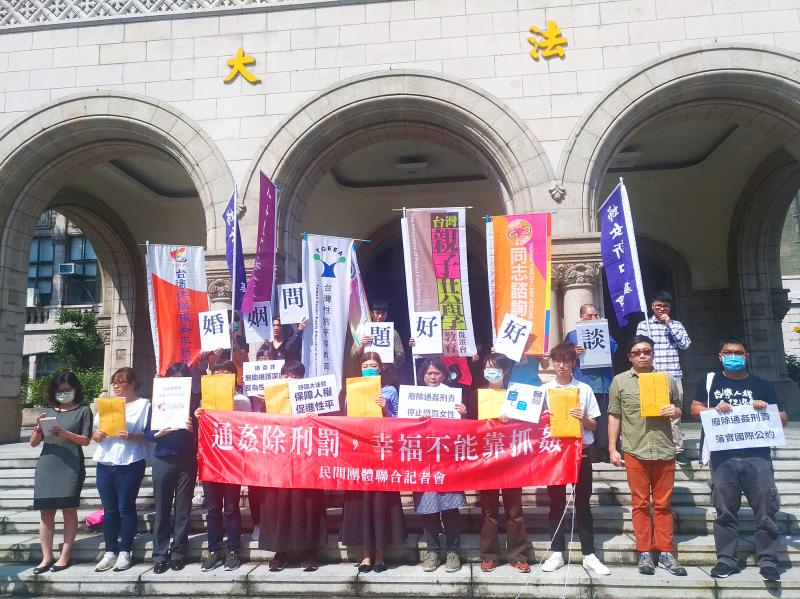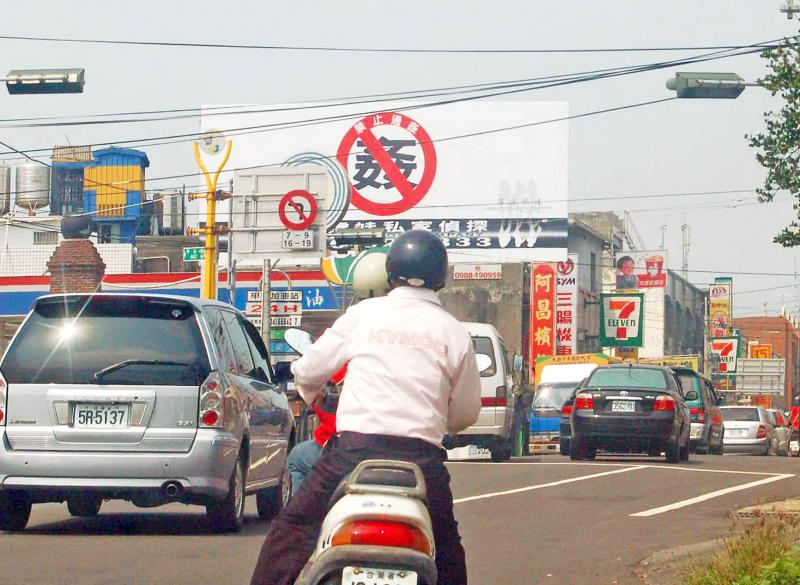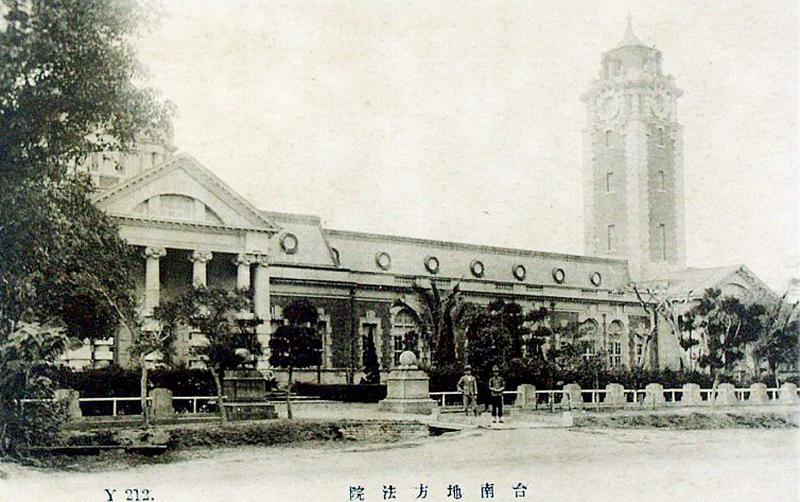April 13 to April 19
In 1773, a Changhua man named Liao Chen-sheng (廖陳生) walked in on his older brother having sex with his wife. He killed both of them with a sickle, beheaded them and took the heads to the authorities.
Killing one’s older brother normally entailed a punishment of death by a thousand cuts, but the law back then granted clemency for husbands who catch their wife cheating — provided that he committed the murder on the spot.

Photo courtesy of US Library of Congress
Taiwan under the Qing Empire had quite comprehensive laws regarding adultery. The general punishment was 90 lashes for both the man and woman, but people who found it too shameful or tedious to go to court would settle the matter privately — often in much more brutal ways. In addition, the husband had the right to divorce or sell the cheating wife.
Over 200 years later, adultery is still a punishable offense in Taiwan. People have been calling for its decriminalization since the early 1990s, and after deeming the law constitutional in 2002, the Council of Grand Justices is expected to make another interpretation next month.
BRUTAL PUNISHMENTS

Photo: Wu Cheng-feng, Taipei Times
Not everyone who killed his wife’s lover during the Qing Dynasty got off as easily as Liao. Japanese anthropologist Kanori Ino mentions this provision in a compendium of Taiwanese customs published in 1901 — although his account included a test.
First of all, the husband would have to get the heads of the wife and lover into the court — either by asking a vendor to smuggle it through the gates in their basket, or by bribing a guard. The two heads would be thrown in a bucket full of water, and if they ended up facing each other, that was proof of the affair. The husband would be rewarded with money for stopping an immoral act, but would also be caned for the murder. If they two heads did not face each other, it would indicate that the victims were innocent, and the husband would face the death penalty.
Due to the frivolousness of this test and a general lack of confidence in the court, more often than not people chose to settle the matter privately, Liu Chi-ying (劉季穎) writes in Research on Adultery Cases in Taiwan During the Qing Dynasty (清代臺灣婦女通姦案件之探究).

Photo: Tsai Chih-ming, Taipei Times
The punishments were often much more brutal than court-ordered ones — Kataoka Iwao’s record on Taiwanese folk customs states that the lightest punishment entailed either shaving the adulterer’s head, cutting his ear off, branding him or forcing him to consume feces. At worst, he would be tied to a rock and thrown into the water, or be half-buried in the ground so that passersby could kick him or spit at him. The same methods were also used on rapists, Iwao writes. Ino also lists sticking a firecracker up the offender’s rectum and setting it off, or gouging his eyes out and parading him through the streets on horseback.
In some cases, the adulterer could atone for his actions by treating the accuser’s family to alcohol or betel nuts, or host an opera performance for villagers to watch. The adulterer could also be asked to donate articles for worship to Buddhist temples with his name written on them, so whoever visited the temple would know what he did.
Another interesting part of Qing law was that the punishment entailed 10 more lashes to each party if the adulterer used trickery or incentives to get the woman to sleep with him as opposed to it happening “naturally.” If the adultery resulted in a child, it was the lover’s responsibility to raise it.

Photo courtesy of Wikimedia Commons
FROM JAPAN TO THE KMT
The Japanese applied their Western-style criminal code to Taiwan when they arrived in 1895. This was updated in 1908 and used for the rest of their rule. Per the new code, the adulterous pair would both be sentenced to under two years imprisonment. The Qing code mandated that only the husband or his relatives could be the accuser; the Japanese law was even stricter as only the husband could press charges. The wife had no such right if her husband slept with others.
The husband also had to report the crime within six months of it happening, and was required to accuse both the wife and her lover. In 1914, Ho A-pao (何阿匏) of Keelung caught his wife cheating and took her lover to court — but the judge mandated that he had to press charges against his wife too. Ho reportedly thought about it for a long time and decided to drop the case since he didn’t want his wife to go to jail.
Unlike Qing law, the Japanese forbid the husband to sell the cheating wife, but since the custom was still prevalent in those days, many people still chose to settle their matters privately.
The newspapers would comment on the prevalence of adultery cases in Taiwan — a 1905 Taiwan Daily News (台灣日日新報) editorial expressed outrage at six cases within two days in Chiayi; another one in 1911 commented on the increasing number of people incarcerated for adultery. A total of 5,703 people were officially charged for the crime between 1909 and 1942; countless more incidents were settled privately.
The 1920s is commonly seen as a period of “awakening” for Taiwanese women, as more began entering the workforce and participating in public affairs. Attitudes toward marriage and education also changed, and in 1927 an amendment to the criminal code was drafted so that women could also charge their husbands with adultery. It was still far from equal, as the case was only valid if the husband abandoned the wife or treated her badly due to his relationship with another woman.
Japan decriminalized adultery in 1947, but by then Taiwan was under Chinese Nationalist Party (KMT) rule. Before 1935, the Republic of China criminal code that the KMT used only punished female adulterers — but by the time they took charge of Taiwan, the law had been changed to treat men and women offenders equally.
This law would persist until present day, making Taiwan one of the few countries in the world that still criminalizes adultery.
Taiwan in Time, a column about Taiwan’s history that is published every Sunday, spotlights important or interesting events around the nation that have anniversaries this week.

Jacques Poissant’s suffering stopped the day he asked his daughter if it would be “cowardly to ask to be helped to die.” The retired Canadian insurance adviser was 93, and “was wasting away” after a long battle with prostate cancer. “He no longer had any zest for life,” Josee Poissant said. Last year her mother made the same choice at 96 when she realized she would not be getting out of hospital. She died surrounded by her children and their partners listening to the music she loved. “She was at peace. She sang until she went to sleep.” Josee Poissant remembers it as a beautiful

Before the last section of the round-the-island railway was electrified, one old blue train still chugged back and forth between Pingtung County’s Fangliao (枋寮) and Taitung (台東) stations once a day. It was so slow, was so hot (it had no air conditioning) and covered such a short distance, that the low fare still failed to attract many riders. This relic of the past was finally retired when the South Link Line was fully electrified on Dec. 23, 2020. A wave of nostalgia surrounded the termination of the Ordinary Train service, as these train carriages had been in use for decades

Lori Sepich smoked for years and sometimes skipped taking her blood pressure medicine. But she never thought she’d have a heart attack. The possibility “just wasn’t registering with me,” said the 64-year-old from Memphis, Tennessee, who suffered two of them 13 years apart. She’s far from alone. More than 60 million women in the US live with cardiovascular disease, which includes heart disease as well as stroke, heart failure and atrial fibrillation. And despite the myth that heart attacks mostly strike men, women are vulnerable too. Overall in the US, 1 in 5 women dies of cardiovascular disease each year, 37,000 of them

Politically charged thriller One Battle After Another won six prizes, including best picture, at the British Academy Film Awards on Sunday, building momentum ahead of Hollywood’s Academy Awards next month. Blues-steeped vampire epic Sinners and gothic horror story Frankenstein won three awards each, while Shakespearean family tragedy Hamnet won two including best British film. One Battle After Another, Paul Thomas Anderson’s explosive film about a group of revolutionaries in chaotic conflict with the state, won awards for directing, adapted screenplay, cinematography and editing, as well as for Sean Penn’s supporting performance as an obsessed military officer. “This is very overwhelming and wonderful,” Anderson